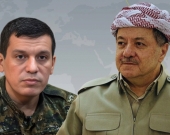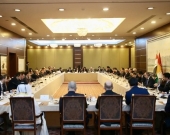Egypt on high alert as Mohammed Morsi trial looms

They are charged with inciting the killing of protesters during clashes outside the presidential palace last December.
Security services are on high alert after supporters of the former president called for major protests.
Mr Morsi was ousted by the military in July after protests against his rule.
Although he won the presidency in a democratic election, during his 13 months in power Mr Morsi fell out with key institutions.
After he was ousted, a sit-in protest in Cairo by Mr Morsi's supporters was violently broken up by the military, leading to the deaths of hundreds of people.
The interim government has also cracked down on the Muslim Brotherhood, from which Mr Morsi hails, banning the Islamist organisation and arresting dozens of senior figures.
His supporters say he was removed in a coup and is now facing a politicised trial. Human rights groups accuse the security services of acting without accountability.
Tight security
On Saturday, Egyptian newspaper al-Watan published what it said were the first images of Mr Morsi in detention.
The images, which have not been independently verified and are undated, show Mr Morsi dressed in a tracksuit and sitting in an armchair, appearing animated and comfortable.
He has been held at a secret location since he was ousted by the military, who had given the then-president a 48-hour ultimatum to end mass protests against his rule.
It is thought Mr Morsi's trial will be held at the Police Academy in Cairo and is expected to start between 07:00 and 08:00 GMT.
The trial of his predecessor, Hosni Mubarak, is being held at the same location - meaning there two former Egyptian presidents being tried concurrently.
Correspondents in Cairo say people are nervous about what the coming days will bring, expecting the trial to deepen the rift between Egyptians and causing greater unrest and instability.
On Sunday evening, gunmen killed two Egyptian policemen near the city of Ismailia, and there are fears more violence could erupt.
The security forces are expected to deploy 20,000 officers to keep order.
They are watching railway and bus stations for gatherings of Islamists and have closed a stretch of underground railway near the trial venue.
Only days before Mr Morsi's trial, three presiding judges stepped down at the trial of Muslim Brotherhood leader Mohammed Badie and his two aides.
Judge Mohammed Fahmy al-Qarmuty said he and his colleagues had a "feeling of embarrassment" over the case.
Legal experts say that if convicted Mr Morsi could be jailed for life or face the death penalty.
'Move to democracy'
Ahead of the trial, US Secretary of State John Kerry stopped in Cairo for a brief visit at the start of his tour of the region.
He called for an end to all violence in the country and urged moves to full democracy. He also said the US was committed to working with Egypt's military-backed rulers.
On his six-hour stop, Mr Kerry met the interim leaders who assumed control following Mr Morsi's removal in July - President Adly Mahmud Mansour, Prime Minister Hazem el-Beblawi, Foreign Minister Nabil Fahmy and army chief Gen Abdel Fattah al-Sisi.
Mr Kerry said Egypt's fortunes, and its bilateral relations, depended on its democratic transition.
"The United States believes that the US-Egypt partnership is going to be stronger when Egypt is represented by an inclusive, democratically elected civilian government based on rule of law, fundamental freedoms and an open and competitive economy," he said.
His Egyptian counterpart, Nabil Fahmy, said Mr Kerry's comments and the "roadmap" Gen Sisi had laid out following the military takeover - which sets out constitutional reform and elections by spring 2014 - indicated that "we are all pursuing a resumption of normal relations".
Mr Kerry also reportedly met members of Egyptian civil society alarmed by the crackdown.
Last month the US froze a large portion of the $1.3bn (£810m) in aid it sends to Egypt, prompting condemnation from Cairo.
BBC












